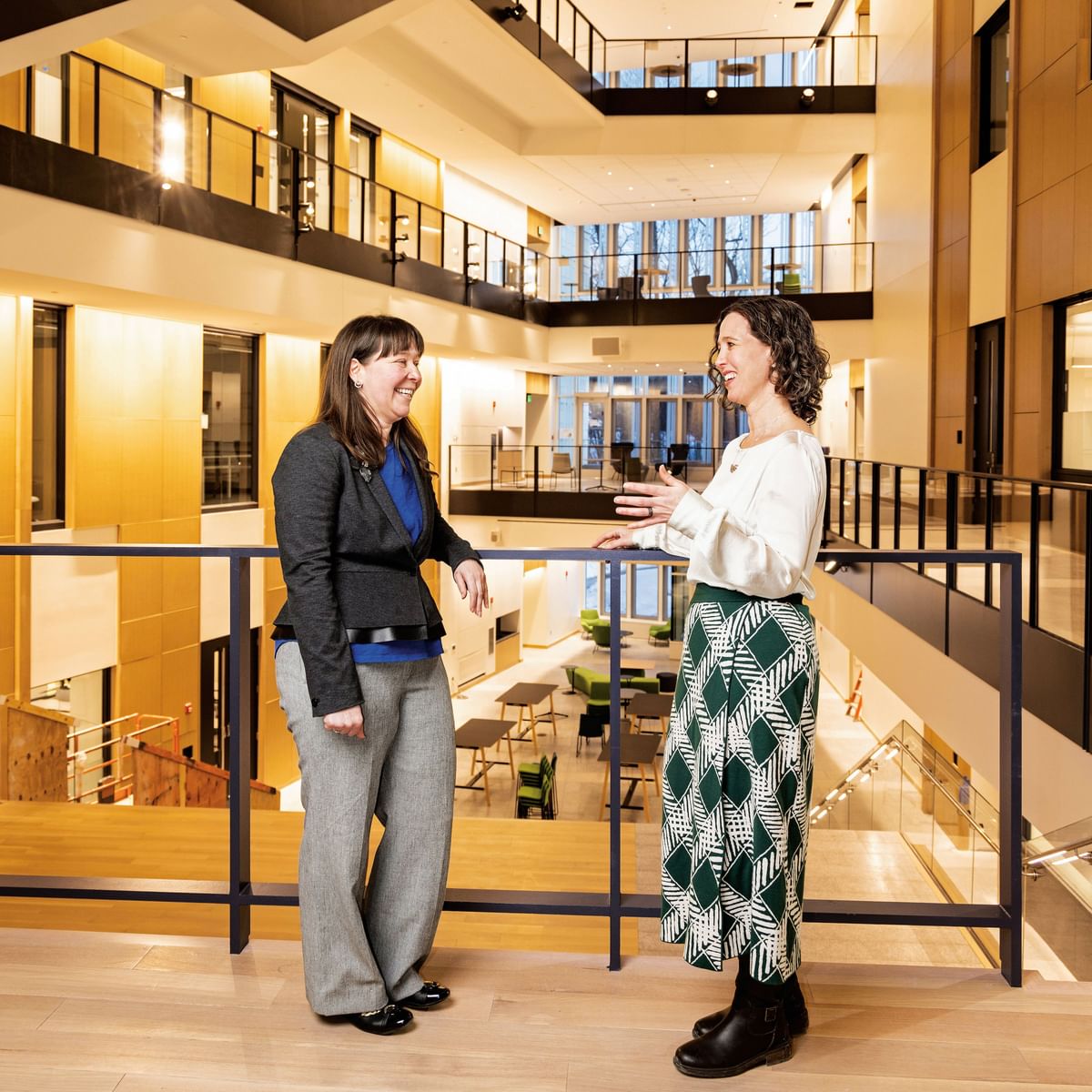- Undergraduate
Bachelor's Degrees
Bachelor of ArtsBachelor of EngineeringDual-Degree ProgramUndergraduate AdmissionsUndergraduate Experience
- Graduate
Graduate Experience
- Research
- Entrepreneurship
- Community
- About
-
Search
All Thayer News

Leading Thoughts: A Rich Intellectual Climate
Jul 01, 2022 | by Alexis R. Abramson | Dartmouth Engineer
The new Class of 1982 Engineering and Computer Science Center is doing more than transforming the look of the West End—it is expanding Dartmouth Engineering’s capacity for innovative research and interdisciplinary learning. I spoke to Professor Margie Ackerman, program area lead for biological and chemical engineering, about her research and how the new building will enable further opportunities for human-centered impact.

CAMPUS CONVERSATIONS: Dean Alexis Abramson (right) talks to Professor Margie Ackerman about her new home inside the new Class of 1982 Engineering and Computer Science Center. (Photo by Rob Strong '04)
First, can you elaborate on your current research?
Ackerman: My group, broadly speaking, works on the role of antibodies in protecting us from infectious disease. We work on understanding the human body’s response to vaccines and learning what the principles of effective antibody-mediated interventions might be. Students in my lab do a lot of molecular biology, cutting and pasting pieces of DNA to make designer proteins that they’ll then go on to test. We look for the not-so-obvious, where the quantity of antibodies present is not well-linked to the outcome of the disease.
You’re working on potential cures and vaccines that could certainly impact society in so many ways.
Ackerman: The work that we are pushing hardest to translate is in the space of herpes simplex virus antibodies. About half the world is infected with HIV, and for neonates, it can be fatal or lead to long-term neurological consequences. We’ve been investigating the ability of antibodies to prevent long-term neurological deficits in mice exposed to HIV and are starting to collaborate with clinicians to design early-stage trials to investigate moving the antibodies proven effective into the clinic. HIV has been a tremendously difficult pathogen to address with vaccines. It was rewarding in the last year to see the people who have been working on it for decades pivot and transition to COVID-19 and apply a lot of technology developed from the HIV vaccine space.
"We're all really excited about how sharing spaces facilitates sharing of expertise."
Professor Margie Ackerman
Let’s talk a little bit about the benefits of moving your lab into the new Engineering and Computer Science Center.
Ackerman: We’re excited about hitting critical mass and being a better intellectually mixed system. We’re all really excited about how sharing space facilitates the sharing of expertise. The open structure of the building will drive connections beyond biotech with biofuels or biomedical devices. Each lab moving into the new space has its own footprint, with personnel working side by side. Some of our people have been in buildings located in other parts of campus, so we’re really excited about coming together. I’m looking forward to better integration at all levels.
Our educational model is designed to empower learning across disciplines. What are the benefits of this approach at the undergraduate and graduate level?
Ackerman: It encourages students to extend beyond their existing interests. They’ll hear more from classmate peers or colleagues in the research labs and be more aware of other opportunities on and around campus. Even our graduate students have great flexibility to choose courses beyond their area of research. For our group, it’s tremendous to be able to draw students from everything from chemistry to quantitative biological sciences to molecular and cell biology. We have students, equipped with different tools, working on addressing shared questions. It makes for a rich intellectual climate and is critical to our success to have such a diverse student base.
— Alexis Abramson is Dean of the Thayer School of Engineering at Dartmouth
This article appeared in the Spring 2022 issue of the Dartmouth Engineer magazine.
For contacts and other media information visit our Media Resources page.
